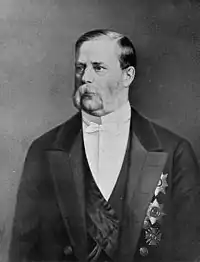Alexander Abaza
Alexander Ageevich Abaza (Александр Агеевич Абаза 1821–1895) was one of the most liberal of the advisors of Alexander II of Russia. He served as minister of finance from October 27, 1880, to May 6, 1881, and unsuccessfully urged the tsar to transform Imperial Russia into a constitutional monarchy. After Alexander II's assassination and the accession of Alexander III, reformers like Abaza were removed from power. In his career he also served as State Comptroller (1871–1874) and as chairman of State Council's Department of the State Economy (1874–1880 and 1884–1892). He was a recipient of the Order of the White Eagle, the Order of Saint Vladimir, the Order of Saint Anna and the Order of Saint Stanislaus.

Alexander Abaza | |
|---|---|
Александр Агеевич Абаза | |
| 1880-1881 Minister to the Russian Empire | |
| Preceded by | Samuil Greig |
| Succeeded by | Nikolai von Bunge |
| Personal details | |
| Born | 1821 Vyshnevolotsky Uyezd, Tver Governorate |
| Died | 1895 Nice, France |
| Alma mater | Saint Petersburg Imperial University |
Biography
Alexander Abaza was born on July 24, 1821 in the Borovinsky distillery in Vyshnevolotsk County, Tver province, in the family of a major landowner and sugar refiner Aggei Vasilievich Abaza and his wife Praskovia, daughter of State Councilor Loggin Mikhailovich Manzey, a Scotsman by birth. Baptized July 31, 1821. Godson of Ivan Alexeevich Melnitsky.[1]
In 1839 he graduated from the Faculty of Law of the Imperial Saint Petersburg University. Since December 13, 1839 he was in military service: in the cavalry pioneer squadron and Leib-Guards at hussar regiment. Abaza took part in hostilities in the Caucasus and was awarded the Order of St. Vladimir, 4th class, with swords),[7] in 1843. On July 17, 1847 retired with the rank of major.
Since 1847 he lived on his mansion, engaged in agriculture and studying financial law. In 1857, he entered the civil service with the rank of collegiate assessor. He joined the enlightened circle grouped around the Grand Duchess Elena Pavlovna and became one of the preachers of the "great reforms".
In 1865-1868, he was a member of the Council of the minister of finance and the first council of the Main society of Russian railways. He took active part in the construction of the Kharkov-Kremenchug railway. Also Abaza was awarded the orders of St. Stanislav, 1st class (1865) and St. Anna, 1st class (1868), as well as the order of Adolph Nassau commander's cross, 1st class, with a star.
Since 1871 was a member of State union of Russian empire. In 1871—1874 was governmental controller and in 1874—1880 was chairman in economy department of State union; 25 May 1879 was established as member of criminal trial, establis hed over revolutionary A.K. Solovyev, who was attempting to kill emperor Alexander II.
In 1872 was given order of St. Vladimir 2-nd degree; in 1876 - order of White eagle; in 1878 - order Saint Alexandr Nevskiy (in 1883 - brilliant signs for order); in 1880 - order of St. Vladimir 1-st degree.
References
- "Петербургский некрополь. Т. 1 : (А - Г) – Российская Национальная Библиотека – Vivaldi". web.archive.org. 2019-12-03. Retrieved 2023-05-12.
Bibliography Polunov, Alexander (2005) Russia in the Nineteenth Century: Autocracy, Reform, and Social Change. Armonk, NY: M.E. Sharpe. ISBN 0-7656-2162-2